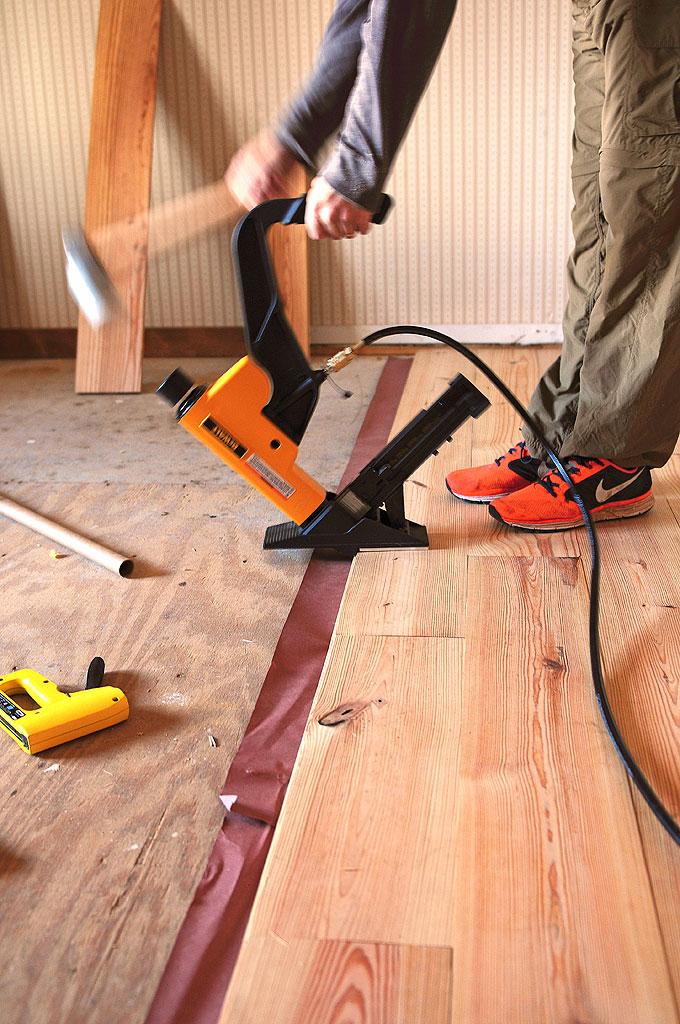The allure of hardwood floors is undeniable – they add warmth, elegance, and durability to any space. But the cost of professional installation can be daunting. So, naturally, the question arises: can I install my own hardwood floors?

Image: dragon-upd.com
The answer, like most in home improvement, is: it depends. It’s not a simple yes or no. The complexity of the installation, your experience level, and available resources all play a role. This article will equip you with the knowledge to confidently decide if tackling this project yourself is right for you.
Understanding the Hardwood Floor Installation Process
Installing hardwood floors involves a series of steps that require both precision and physical strength. From prepping the subfloor to nailing down planks, each step demands attention to detail. There are two main types of hardwood floor installations: nail-down and glue-down. Nail-down involves securing planks to a subfloor using nails, suitable for solid hardwood planks. Glue-down, on the other hand, uses adhesive to secure planks to a subfloor, often preferred for engineered hardwood planks.
Before diving into the process, you need to assess your skills and resources. Are you comfortable working with power tools, measuring accurately, and following detailed instructions? You’ll need a variety of tools, including a saw, hammer, tape measure, and possibly a flooring nailer or staple gun.
Essential Factors to Consider
To make an informed decision, consider these crucial factors:
- Experience level: Have you undertaken similar DIY projects before? Experience with carpentry or flooring installation will be an advantage.
- Available Tools: Do you have access to the necessary tools, like a saw, hammer, nail gun, and flooring level? Renting tools can add to the project cost.
- Time Commitment: This project requires time and dedication. Consider your availability and potential disruptions to your daily life.
- Project Complexity: The difficulty of the installation depends on factors like the floor’s size, layout, and the type of wood you choose. For instance, installing hardwood over an uneven subfloor is more challenging.
- Budget: While DIY can save on labor costs, you still need to factor in the cost of materials, tools (if you need to purchase), and potential mistakes.
Is DIY Hardwood Flooring Right for You?
If you’re a meticulous DIYer with a good understanding of construction and a willingness to learn, installing hardwood floors yourself is achievable. However, if you’re hesitant or lack the necessary tools and experience, it’s wiser to hire a professional.
Don’t underestimate the complexity of flooring installation. Mistakes can lead to uneven floors, squeaks, and damage to your home. A professional installer can ensure a high-quality installation that meets building codes and surpasses your expectations.

Image: shewearsmanyhats.com
Tips and Expert Advice
If you’re determined to try this DIY project, here’s some expert advice:
- Research Thoroughly: Watch videos, read articles, and seek guidance from experienced DIYers. The more knowledge you have, the better equipped you’ll be.
- Plan Carefully: Measure your space meticulously, considering doorways, transitions, and existing fixtures. Draw out a detailed floor plan to ensure an accurate installation.
- Invest in Quality Tools: Don’t skimp on tools; use high-quality equipment to achieve the best results.
- Start Small: If you’re new to flooring installation, start with a small area, like a closet or hallway, to gain experience before tackling a larger space.
- Take Your Time: Flooring installation requires patience. Don’t rush the process; take your time to ensure each step is completed correctly.
- Seek Assistance When Needed: If you encounter challenges or feel overwhelmed, don’t hesitate to seek assistance from a professional or experienced DIYer.
Remember, DIY flooring installation can be a rewarding experience, but it comes with its own set of challenges. By understanding the process, preparing adequately, and seeking guidance when needed, you can increase your chances of success.
Frequently Asked Questions
Q1: What type of hardwood flooring is best for DIY installation?
For beginners, engineered hardwood is generally easier to work with than solid hardwood. It’s more stable and less prone to warping.
Q2: Can I install hardwood floors over existing tile?
While possible, it’s not recommended for DIYers. Installing hardwood over tile can lead to uneven surfaces and potential problems with the subfloor.
Q3: How can I make sure my hardwood floors are level?
Using a level tool and shims, adjust the subfloor to ensure it’s level before installing the planks. This is crucial for a smooth and even floor.
Q4: What should I do if I make a mistake?
Don’t panic! It’s part of the learning process. For minor mistakes, careful removal and reinstallation might be an option. For major issues, consult a professional for guidance.
Can I Install My Own Hardwood Floors
Conclusion
Installing hardwood floors yourself isn’t for everyone, but it can be a rewarding project for those with the skills, patience, and a willingness to learn. Assess your experience, resources, and the complexity of your project before embarking on this journey. Remember, it’s always better to err on the side of caution and seek professional help if needed.
Are you considering installing your own hardwood floors? Share your thoughts and experiences in the comments below!






